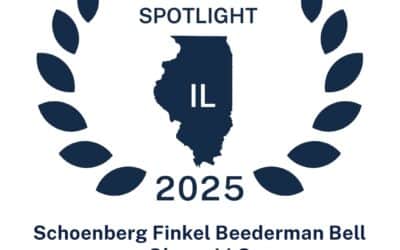On August 9, 2022, SFBBG attorneys, Phil Zisook and Bill Klein, prevailed in an Illinois Appellate Court case where our clients were sued concerning a failed real estate transaction. The proposed transaction involved the transfer of three parcels of real estate consisting of a golf course in Michigan, a Chicago office building, and a River North condominium. The case, Greenberg v. Angelopoulos, was filed in the Circuit Court of Cook County and sought compensatory damages in excess of $1 million for breach of contract, bad faith breach of contract, promissory estoppel, equitable estoppel, unjust enrichment, tortious interference with contract, and fraud in addition to unspecified punitive damages. The parties had entered into a letter of intent (“LOI”) which expressly required the preparation and execution of a formal agreement by a date certain. The plaintiff never prepared the formal agreement notwithstanding his claim that Angelopoulos orally agreed to several iterations of proposed terms. Ultimately Angelopoulos purchased the properties from Greenberg’s lender which had foreclosed on the properties. Through SFBBG’s motions to dismiss, the court dismissed all but the promissory estoppel and fraud counts prior to discovery going forward. After the depositions concluded, the court granted SFBBG’s motion for summary judgment on the promissory estoppel and fraud counts. Greenberg appealed the grant of summary judgment and the dismissal of his bad faith breach of contract count.
In affirming the dismissal of the bad faith count, the appellate court agreed that the plaintiffs “failed, despite repeated opportunities, to allege that a formal agreement was ever even tendered, much less executed.” Moreover, although the plaintiff claimed that the failure to prepare the formal agreement was Angelopoulos’ fault since he never communicated that the formal agreement should be drafted and executed, “that need was apparent from the plain language of the LOI.” The court found that the execution of the formal agreement was an express condition precedent of Angelopoulos having any obligation to purchase the properties. The court further held, “Even assuming the LOI was an enforceable contract, … Greenberg did not perform his obligations under it since he failed to “prepare a draft of the formal agreement. Greenberg cannot now complain that Angelopoulos breached his duties under the same instrument … when Greenberg never prepared a draft of the formal agreement for Angelopoulos to sign.”
In affirming the grant of summary judgment to Angelopoulos on the promissory estoppel claim, the court found that promissory estoppel is subject to the statute of frauds. Because Greenberg never prepared the required Formal Agreement, the statute of frauds rendered the claimed oral promises of Angelopoulos to proceed with the deal unenforceable. The court also found that Greenberg’s argument that equitable estoppel barred the operation of the statute of frauds had been forfeited by Greenberg on appeal.
With respect to Greenberg’s fraud claim, the court affirmed the grant of summary judgment to Angelopoulos because Greenberg did not and could not prove reasonable reliance: “We cannot say that plaintiffs reasonably relied on Angelopoulos’ alleged representations … when Greenberg failed to perform the LOI’s condition precedent by not drafting a formal purchase agreement for Angelopoulos to sign.” The court also found that Greenberg failed to prove that Angelopoulos made any false statements of material fact.
If you have any questions regarding this post, please feel free to contact Bill Klein or Phil Zisook, or call (312) 648-2300.



